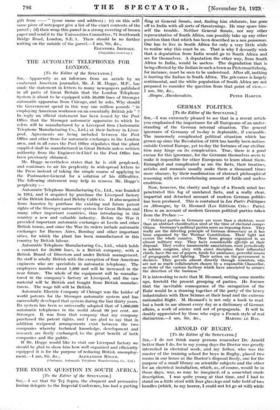GERMAN POLITICS.
[To the Editor of the SPECTATOR.] SIR,—I was extremely pleased to see that in a recent article you emphasised the importance for all Europeans of an under- standing of the German internal situation. The general ignorance of Germany of to-day is deplorable, if excusable. The immensely complicated political situation which has grown up since the Revolution of 1918 has hardly been notices outside Central Europe, yet to-day the fortunes of our civiliza• tion may hinge on its complexities. True, there is a good excuse for this ignorance, for the Germans themselves seem to make it impossible for other Europeans to learn about them. Entangled and complicated as are the facts, their treatises, articles and manuals usually make them a thousand times more obscure, by their combination of abstract philosophical reasoning with an overwhelming amount of futile and useless erudition.
Now, however, the clarity and logic of a French mind has penetrated this fog of unrelated facts, and a really clear, impartial and detached account of modern German politics has been produced. This is contained in Les Partis Politiques en Allemagne, by 0. Hesnard (Les Editions Cres : Paris). Here is an account of modern German political parties taken from the Preface :—
" Political parties in Germany are more than a skeleton, more than an abstract classification used at the time of electoral compe- titions. Germany's political parties seem an imposing force. They really are the directing principle of German democracy as it has been organized by the Weimar Constitution. Their tight net covers the whole country. They form groups organized in an almost military way. They have considerable effeclifs at their disposal. They evolve innumerable associations, meet periodically in solemn congress, obey with strict discipline their influential chiefs, have the use of papers, funds for assistance, powerful means of propaganda and fighting. Their action on the government is decisive. They govern almost directly through ministers, who are not so much collaborators chosen by a responsible Chancellor, as clerks of the various factions which have associated to assume the direction of the business."
It is interesting to note that M. Hesnard, writing some months ago, foretold the present grouping of parties. He foresaw that the inevitable consequence of the occupation of the Ruhr would be a drawing together of the party of the heavy industrialists with Herr Stinnes at their head and the extreme nationalist Right. M. Hesnard's is not only a book to read.
but a book to use almost every day as a dictionary of German affairs, a work of science and not of propaganda. It will be doubly appreciated by those who enjoy a French style of real


















































 Previous page
Previous page